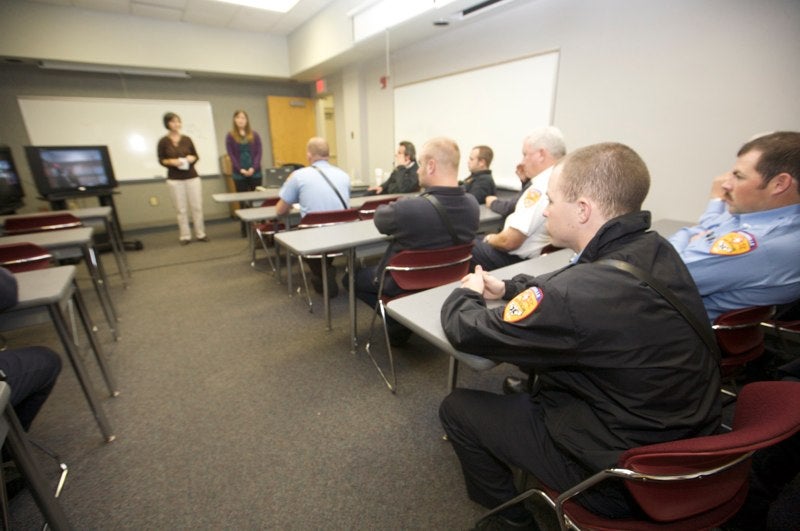Increasing awareness about aphasia

Sherri Winslow, left, clinical supervisor in the ECU Department of Communication Sciences and Disorders in the College of Allied Health Sciences, and Mary Beth Woody, a second-year graduate student, lead an aphasia awareness training session Monday at the Greenville Fire-Rescue Department. Photo by Cliff Hollis.
GREENVILLE, N.C. — ECU has partnered with the Greenville Fire-Rescue Department to get the word out about aphasia, which is difficulty or loss in communication usually created by stroke or brain injury.
Sherri Winslow, clinical supervisor in the ECU Department of Communication Sciences and Disorders, and Mary Beth Woody, a second year graduate student, have been leading aphasia awareness training for emergency responders to help them learn more about the acquired language disorder and how to improve communication interactions with people with aphasia.
The training has been so successful that there are plans to take it to rescue agencies across Pitt County.
On Monday morning, more than 15 city fire and rescue personnel gathered in a station conference room. Close to 140 will receive the training in three sessions, said L.R. Hines, battalion chief of safety and training for Greenville Fire-Rescue.
“The brain is very complex so there are lots of ways aphasia can manifest itself in patients,” Woody said. Some people may be able to speak clearly, but have trouble understanding conversation. Others may comprehend everything, but may only be able to speak a few words. The disorder does not affect a person’s intelligence, although it can affect reading and writing.
About 40 percent of people with stroke, and about one-third of people who suffer severe head injuries, will get aphasia. North Carolina is in the nation’s stroke “belt,” and eastern North Carolina is the “buckle” with the highest rate of death due to stroke in the nation. An estimated 625 people in Pitt County, and about 37,000 in North Carolina, have been diagnosed with aphasia.
Emergency responders have opportunities to come in contact with people suffering aphasia during emergency calls, service calls or vehicle stops. In general, Woody suggested that firefighters look for halting or garbled speech, or someone who is groping for words or uses nonsensical words.
“We can’t tell you what will work with every patient, every time,” Woody said.
ECU’s speech language and hearing clinic is providing aphasia patients with identification cards and windshield and window decals to let emergency responders know about their condition.
Woody got the idea for doing local training after attending a North Carolina Speech-Language-Hearing Association meeting. She heard about a traffic stop in another state that resulted in someone with aphasia spending the night in jail because the officer mistakenly thought the man was intoxicated. Materials for the training, including a quiz and video, were provided by the National Aphasia Association.
Hines said the training has been beneficial and is an important reminder to rescue personnel. “It may be something other than what it first appears,” Hines said.
For more information on the training, contact Winslow at 252-744-6142.